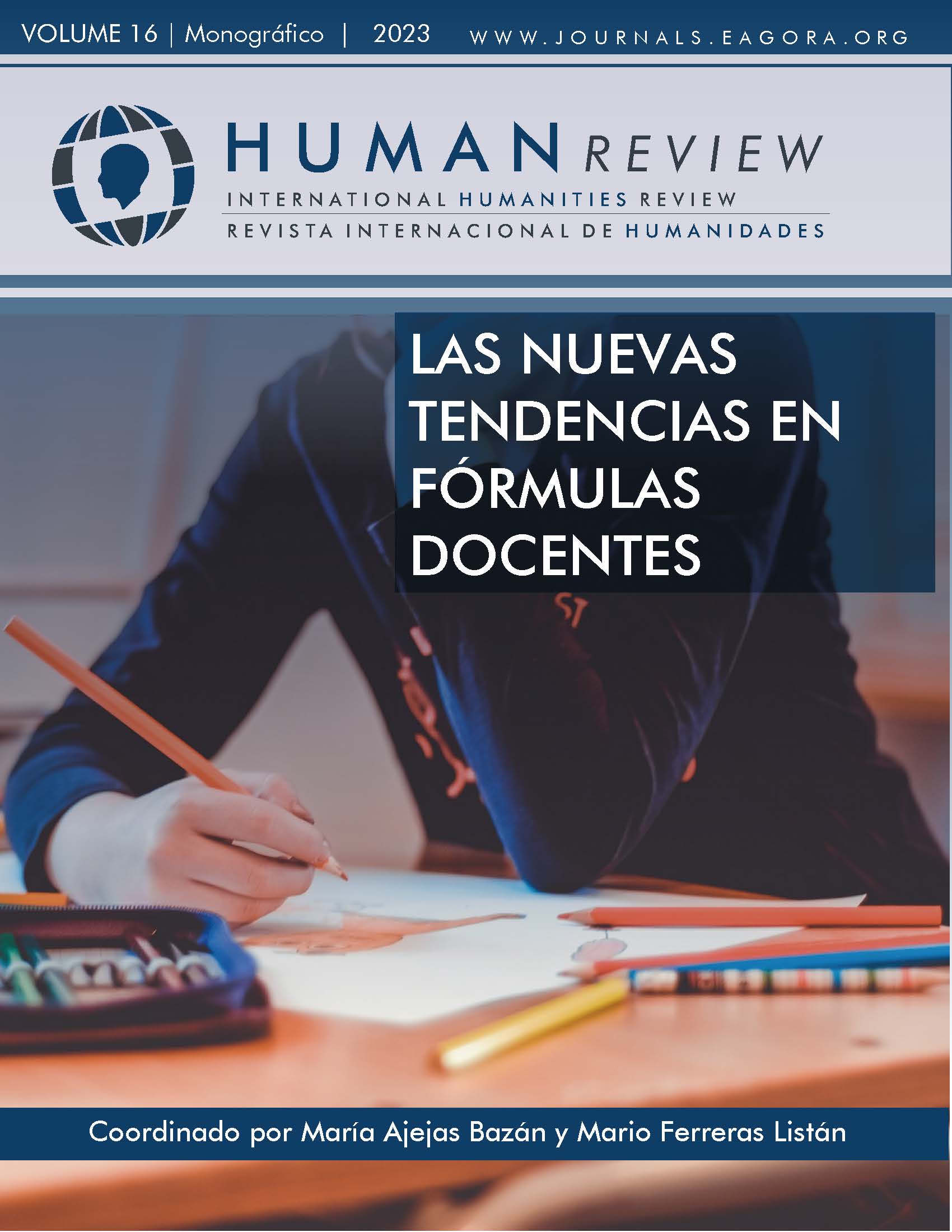Microlearning in the Final Degree Project (FDP) subject
DOI:
https://doi.org/10.37467/revhuman.v12.4644Keywords:
Microlearning, Microvideos, Knowledge pills, Formative pills, Final Degree Project, Virtual tutoring, University teachingAbstract
This article aims to give continuity to a pilot project carried out in the Master’s Degree in Teacher Training at the International University of Valencia in 2021-2022. Based on its implementation, results and evaluation, it has been decided to improve the project this academic year 2022-2023 by including some methodological changes and tutoring activities for postgraduate students taking the master’s degree final project subject in this degree. These changes are expected to lead to an improvement in teaching quality in this subject and can also be emulated in other degrees.
References
Barradas-Gudiño, J. (2020). Microlearning como herramienta de entrenamiento tecnológico del docente universitario. Revista Tecnológica-Educativa Docentes 2.0, 8(2), 28-33. https://doi.org/10.37843/rted.v8i2.172
Cabero, J. (1998). Propuestas para utilizar el vídeo en los centros. Comunicación y Pedagogía: nuevas tecnologías y recursos didácticos, 152, 120-137.
Conopoima Moreno, Y. C., Ferreira Lorenzo, G. L., Baque Chiquito, F. y Álvarez Márquez, G. E. (2021). Las píldoras educativas: colección de herramientas automatizadas para su desarrollo. Revista Metropolitana de Ciencias Aplicadas, 4(1), 90-98. https://remca.umet.edu.ec/index.php/REMCA/article/view/352
Crespo Miguel, M. y Sánchez-Saus Laserna, M. (2020). Learning pills for the improvement of University Education: the case of the Degree thesis in the Degree of Linguistics and Applied Languages of University of Cadiz. Education in the Knowledge Society, 21, article 02, https://doi.org/10.14201/eks.19228
Dash, A. (2002). Introducing the microcontent client [blog]. https://anildash.com/2002/11/13/introducing-microcontent-client/
Dolasinski, M. J., & Reynolds, J. (2020). Microlearning: A New Learning Model. Journal of Hospitality & Tourism Research, 44(3), 551–561. https://doi.org/10.1177/1096348020901579
Gallent Torres, C. y Caballé Llima, S. (2022). La cotutorización de Trabajos de Fin de Máster a través de píldoras educativas en un entorno de aprendizaje virtual. VI Congreso Internacional sobre Innovación Pedagógica y Praxis Educativa. Innovagogía 2022. 25-27 de mayo de 2022. https://drive.google.com/file/d/1aBawKiUyNXQKrJiF5jVKRHbaOW2ELlVj/preview
García-Mendoza, D., & Corral-Joza, K. (2021). El microaprendizaje y su aporte en la habilidad de concentración en estudiantes de bachillerato. Revista Innova Educación, 3(4), 28-39. https://doi.org/10.35622/j.rie.2021.04.002
Giurgiu, L. (2017). Microlearning an Evolving e-learning trend. Scientific Bulletin, 22(1), 18-23. https://doi.org/10.1515/bsaft-2017-0003
Martínez-Huamán, E., Quispe Morales, R. A., Gutiérrez Mendoza, J., & García Rivas Plata, C. E. (2022). Gestión educativa y competencias: concepciones del docente universitario. Revista Venezolana De Gerencia, 27(7), 266-280. https://doi.org/10.52080/rvgluz.27.7.18
Muñoz Cantero, J.M., Espiñeira Bellón, E.M. y Rebollo Quintela, N. (2016). Las píldoras formativas: diseño y desarrollo de un modelo de evaluación en el Espacio Europeo de Educación Superior. Revista de Investigación en Educación, 14(2), 156-169. https://dialnet.unirioja.es/servlet/articulo?codigo=5698033
Organización de las Naciones Unidas para la Educación, la Ciencia y la Cultura (UNESCO) (2017). Educación para los Objetivos de Desarrollo Sostenible: objetivos de aprendizaje. https://unesdoc.unesco.org/ark:/48223/pf0000252423
Pérez, E. y Maldonado, G. A. (2016). Los vídeo-tutoriales como recurso en el ámbito educativo. En M.L. Cacheiro, C. Sánchez y J.M. González (Coords.), Recursos tecnológicos en contextos educativos (pp. 313-334). UNED.
Pérez-Serrano, M. J., Rodríguez-Pallares, M., & González-Alonso, M. Y. (2020). Utilidad de las tutorías académicas en la universidad: Resultados agregados de un estudio multidimensional en diferentes ciencias. Revista de Ciencias de la Comunicación e Información, 251, 57–74. https://doi.org/10.35742/rcci.2020.25(1).57-74
Real Decreto 1393/2007, de 29 de octubre, por el que se establece la ordenación de las enseñanzas universitarias oficiales (disposición derogada). Boletín Oficial del Estado, 260, de 30 de octubre. https://www.boe.es/buscar/pdf/2007/BOE-A-2007-18770-consolidado.pdf
Real Decreto 822/2021, de 28 de septiembre, por el que se establece la organización de las enseñanzas universitarias y del procedimiento de aseguramiento de su calidad. Boletín Oficial del Estado, 233, de 29 de septiembre de 2021, 119537-119578. https://www.boe.es/boe/dias/2021/09/29/pdfs/BOE-A-2021-15781.pdf
Salinas, J. y Marín, V. I. (2014). Pasado, presente y futuro del microlearning como estrategia para el desarrollo profesional. Campus Virtuales, 2(3), 46-61. http://uajournals.com/ojs/index.php/campusvirtuales/article/view/59
Trabaldo, S., Mendizábal, V. y González Rozada, M. (2017). Microlearning: experiencias realies de aprendizaje personalizado, rápido y ubicuo [Conferencia]. http://sedici.unlp.edu.ar/handle/10915/65550
Urpí, C. (2019). Investigación, docencia y transferencia de programas educativos patrimoniales. Un proyecto de tutoría piramidal de trabajos de fin de grado. ENSAYOS. Revista de la Facultad de Educación de Albacete, 34(1), 121-136. https://doi.org/10.18239/ensayos.v34i1.2051
Downloads
Published
How to Cite
Issue
Section
License
Those authors who publish in this journal accept the following terms:
- Authors will keep the moral right of the work and they will transfer the commercial rights.
- After 1 year from publication, the work shall thereafter be open access online on our website, but will retain copyright.
- In the event that the authors wish to assign an Creative Commons (CC) license, they may request it by writing to publishing@eagora.org









